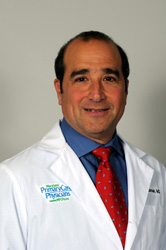Aging Well: 8 Things You Can Do Now
by Michael Riebman, M.D.
“Grow old along with me. The best is yet to be.” This quote from the poet Robert Browning, while written back in 1840, is the way many people are looking at aging today. We are on the cusp of learning more and more about the secrets to longevity—and the fact that our health isn’t predetermined only by our genes. Our lifestyle habits and choices have a huge impact on aging well, and successfully.
The average life expectancy in the US today is age 76 for men, 81 for women; and many people are living well above these averages into their late 80s and 90s. But for most of us simply living longer isn’t enough.
“What we really want is to live longer- and healthier,” says Michael Riebman, M.D. of MPCP in Annapolis. “Quality of life and staying active enough to do the things we enjoy is the goal of most of my patients.” And, according to Dr. Riebman and other health experts, there is growing scientific evidence that much of how well we age lies in our own hands.
While it definitely helps to have good genes, here are eight research-based tips on what you can do to encourage a longer, healthier life :
- Exercise Your Body. Staying physically active is crucial to maintaining your health and weight. Shoot for 30 minutes of activity every day to help your cardiovascular health, bone & muscle health and mental health. Fitness also helps your balance and reduces the risk of falls and fractures as you age.
- Exercise Your Mind & Social Skills. Stay engaged and try new activities to keep your mind sharp. Start a new hobby, take a course in something that interests you, listen to different music. Also make sure you stay engaged socially. According to the Harvard Study of Adult Development, the relationships we cultivate have a greater impact on aging well than the events we experience.
- Eat Well & Maintain Weight. Obesity is a huge problem in our country and contributes to many diseases. “Eating a balanced diet and having a proper weight can’t be overlooked for good health,” says Dr. Riebman. He encourages a diet rich in fruits, vegetables, whole grains and fiber and low in saturated fat and cholesterol. “Getting essential nutrients from our food is key and even taking some supplements as we age can help,” he adds.
- Get Regular Check-ups. Preventive care and early detection of disease helps you live longer. See your primary care doctor as a partner in health and be frank about your health concerns. Staying on top of high blood pressure or cholesterol, or other chronic problems, as well as getting the right screening exams at certain ages, is critical. Even some vaccinations are now suggested for older adults.
- Stop Smoking Already! Cigarette smoking is the #1 cause of preventable death. And, it’s never too late to quit and start getting immediate health benefits. There are many options to help you quit, so talk to your doctor or seek out resources.
- Be Safe. Studies show that important daily habits, such as wearing a seat belt, using a bike helmet, taking medications correctly, using sunscreen regularly, etc. all add up to a significantly longer, healthier life.
- Sleep Well. Sleep is restorative to our bodies and adults need 7-8 hours a night. This doesn’t really change as we get older so make sleep a priority at every age.
- Attitude Adjustments. According to a major Gallup poll of people age 18-85, levels of stress and worry hit a low point and well-being hits a high point by age 85. People with a positive attitude live longer and enjoy life more. Talk to someone if you feel depressed or anxious; there are many ways to help. And try to add a little humor – laughter is one of our best defenses!
 Dr. Riebman is certified by the American Board of Family Medicine and is the current President of Maryland Primary Care Physicians, LLC. He received his medical degree from Medical University of South Carolina in 1985 and completed his residency program in Family Practice at the Lancaster General Hospital in 1988.
Dr. Riebman is certified by the American Board of Family Medicine and is the current President of Maryland Primary Care Physicians, LLC. He received his medical degree from Medical University of South Carolina in 1985 and completed his residency program in Family Practice at the Lancaster General Hospital in 1988.Recommended Posts
Got Friends? You’ll Live Longer
By Andrea Cuniff, M.D.
Diet After 50: Food Choices & Exercise Prove Critical
By Amanda Malone, M.D., Rachel Sweeney, CRNP
Osteoarthritis
By Paul Chite, M.D.





